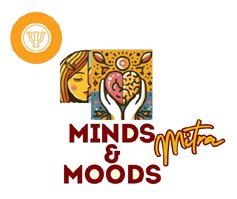Navigating Emotional Extremes: A Guide to Mood Disorder Interventions 🎢
Mood disorders are a group of mental health conditions that cause significant disruptions in a person’s emotional state, leading to prolonged periods of extreme happiness (mania) or sadness (depression). Unlike normal mood swings, these emotional shifts are intense, persistent, and can severely impact a person’s ability to function in daily life. Professional mood disorder interventions from a qualified psychotherapist or psychologist are crucial for managing these conditions and restoring emotional balance.
A Trusted Professional in Nagpur: Rrimi Bodalkar
For those seeking expert care in Nagpur, Rrimi Bodalkar, a Sr. Psychotherapist / Mental Health Counsellor, is a highly qualified professional. With her M.A. in Psychology (Counselling) and PGDMH (Clinical), she has extensive experience in a wide range of therapeutic practices. Her specialization in CBT, REBT & DBT (Specialised) makes her particularly adept at providing effective mood disorder interventions. As an NSDC Certified professional in Psychometric Analysis & Learning Style Assessment, she is well-equipped to provide a holistic and data-driven approach to helping clients understand their emotions, build confidence, and find a path toward emotional stability.
Spotting the Signs: Symptoms & Causes
Recognizing the symptoms of a mood disorder is the first step toward getting help. Symptoms can vary greatly depending on the specific disorder, but generally fall into two categories: depressive and manic/hypomanic.
- Depressive Symptoms: These can include a persistent sad or empty mood, a loss of interest in once-enjoyed activities, feelings of worthlessness or guilt, fatigue, changes in sleep and appetite, and difficulty concentrating. In severe cases, they may lead to suicidal thoughts. A skilled depression therapist can help with these symptoms.
- Manic/Hypomanic Symptoms: These are characterized by an abnormally elevated or irritable mood, increased energy, racing thoughts, rapid speech, decreased need for sleep, and engaging in risky behaviors.
The causes of mood disorders are complex and multifaceted. They are believed to be a combination of several factors:
- Biological & Genetic Factors: Research suggests that imbalances in brain chemicals like serotonin and dopamine play a key role. Mood disorders also tend to run in families, indicating a genetic predisposition.
- Environmental & Psychological Factors: Stressful life events, a history of trauma, childhood abuse, and chronic workplace stress can be major risk factors for developing a mood disorder.
- Medical Conditions & Substances: Certain medical conditions, such as a brain tumor or a hormonal imbalance, can trigger symptoms. The use of certain medications, alcohol, or other substances can also induce a mood disorder.
The Procedure of Treatment: A Multi-faceted Approach
The procedure of treatment for mood disorders is often a combination of different interventions tailored to the individual’s needs. A counselling center will typically offer a comprehensive plan.
- Initial Diagnosis and Assessment: The first step is a thorough evaluation by a mental health counsellor or psychiatrist to confirm the diagnosis and rule out other medical conditions. The professional will review your symptoms, personal history, and family history of mental health. This may also include a Neuropsychological testing or IQ testing to rule out other conditions.
- Psychotherapy: Talk therapy is a cornerstone of mood disorder interventions. Several types are highly effective:
- Cognitive Behavioral Therapy (CBT): Helps individuals identify and challenge negative thinking patterns and irrational beliefs that fuel their mood swings.
- Rational Emotive Behavior Therapy (REBT): A more directive form of CBT that focuses on disputing rigid “should” and “must” statements that contribute to emotional distress.
- Dialectical Behavior Therapy (DBT): Teaches skills in emotional regulation, distress tolerance, and mindfulness, especially useful for individuals with intense mood swings.
- Medication Management: Antidepressants, mood stabilizers, and other medications may be prescribed to regulate brain chemistry and manage symptoms. This is often done in conjunction with psychotherapy for the best results.
- Lifestyle Changes: The therapist will help the client develop self-management strategies, such as regular exercise, a balanced diet, and sufficient sleep, which are all vital for stabilizing mood.
- Ongoing Support: The individual may be encouraged to participate in support groups and continue with personal counselling to build long-term resilience and prevent relapse. This can also involve executive coaching or career counselling to help with a return to work.
Frequently Asked Questions (FAQ’s)
Q1: How long do mood disorder interventions take to work?
A: The timeline varies for each person. While some may see improvement in a few weeks, it can take several months or even longer to fully manage the condition. Consistency with the procedure of treatment is key.
Q2: Are mood disorders the same as normal mood swings?
A: No. While everyone experiences mood swings, mood disorders are characterized by their intensity, persistence, and the significant impact they have on a person’s life, including work, school (academic stress), and relationships.
Q3: Can a psychologist help with a mood disorder without medication?
A: In some cases, therapy alone can be effective, especially for mild to moderate conditions. However, for more severe mood disorders, a combination of therapy and medication is often the most effective treatment plan.
Q4: Can a child psychologist help with a mood disorder in a child?
A: Yes. Mood disorders can affect people of any age, including children. A child psychologist can provide tailored mood disorder interventions and can also provide support for special needs children.
Q5: What is the difference between a depression therapist and a mental health counsellor?
A: A depression therapist specializes in the treatment of depression specifically, while a mental health counsellor is a broader term that encompasses a wide range of mental health issues, including anxiety, stress, and mood disorders.

